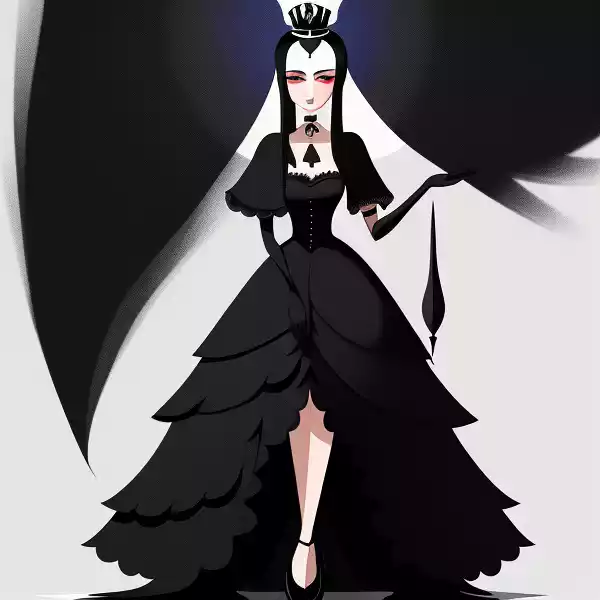 | |
Queen of Spades | |
| Author | Edward Payson Roe |
|---|---|
| Published |
1858
|
| Language | English |
| Nationality | American |
| Genre | Domestic Fiction, Romance |
1858 Short Story
Queen of Spades
Queen of Spades is an English Domestic Fiction, Romance short story by American writer Edward Payson Roe. It was first published in 1858.
Queen of Spades
by Edward Payson Roe
“Mother,” remarked Farmer Banning, discontentedly, “Susie is making a long visit.”
“She is coming home next week,” said his cheery wife. She had drawn her low chair close to the air-tight stove, for a late March snowstorm was raging without.
“It seems to me that I miss her more and more.”
“Well, I’m not jealous.”
“Oh, come, wife, you needn’t be. The idea! But I’d be jealous if our little girl was sorter weaned away from us by this visit in town.”
“Now, see here, father, you beat all the men I ever heard of in scolding about farmers borrowing, and here you are borrowing trouble.”
“Well, I hope I won’t have to pay soon. But I’ve been thinking that the old farmhouse may look small and appear lonely after her gay winter. When she is away, it’s too big for me, and a suspicion lonely for us both. I’ve seen that you’ve missed her more than I have.”
“I guess you’re right. Well, she’s coming home, as I said, and we must make home seem home to her. The child’s growing up. Why, she’ll be eighteen week after next. You must give her something nice on her birthday.”
“I will,” said the farmer, his rugged, weather-beaten face softening with memories. “Is our little girl as old as that? Why, only the other day I was carrying her on my shoulder to the barn and tossing her into the haymow. Sure enough, the 10th of April will be her birthday. Well, she shall choose her own present.”
On the afternoon of the 5th of April he went down the long bill to the station, and was almost like a lover in his eagerness to see his child. He had come long before the train’s schedule time, but was rewarded at last. When Susie appeared, she gave him a kiss before every one, and a glad greeting which might have satisfied the most exacting of lovers. He watched her furtively as they rode at a smart trot up the hill. Farmer Banning kept no old nags for his driving, but strong, well-fed, spirited horses that sometimes drew a light vehicle almost by the reins. “Yes,” he thought, “she has grown a little citified. She’s paler, and has a certain air or style that don’t seem just natural to the hill. Well, thank the Lord! she doesn’t seem sorry to go up the hill once more.”
“There’s the old place, Susie, waiting for you,” he said. “It doesn’t look so very bleak, does it, after all the fine city houses you’ve seen?”
“Yes, father, it does. It never appeared so bleak before.”
He looked at his home, and in the late gray afternoon, saw it in a measure with her eyes–the long brown, bare slopes, a few gaunt old trees about the house, and the top boughs of the apple-orchard behind a sheltering hill in the rear of the dwelling.
“Father,” resumed the girl, “we ought to call our place the Bleak House. I never so realized before how bare and desolate it looks, standing there right in the teeth of the north wind.”
His countenance fell, but he had no time for comment. A moment later Susie was in her mother’s arms. The farmer lifted the trunk to the horse-block and drove to the barn. “I guess it will be the old story,” he muttered. “Home has become ‘Bleak House.’ I suppose it did look bleak to her eyes, especially at this season. Well, well, some day Susie will go to the city to stay, and then it will be Bleak House sure enough.”
“Oh, father,” cried his daughter when, after doing his evening work, he entered with the shadow of his thoughts still upon his face–“oh, father, mother says I can choose my birthday present!”
“Yes, Sue; I’ve passed my word.”
“And so I have your bond. My present will make you open your eyes.”
“And pocket-book too, I suppose. I’ll trust you, however, not to break me. What is it to be?”
“I’ll tell you the day before, and not till then.”
After supper they drew around the stove. Mrs. Banning got out her knitting, as usual, and prepared for city gossip. The farmer rubbed his hands over the general aspect of comfort, and especially over the regained presence of his child’s bright face. “Well, Sue,” he remarked, “you’ll own that this room in the house doesn’t look very bleak?”
“No, father, I’ll own nothing of the kind. Your face and mother’s are not bleak, but the room is.”
“Well,” said the farmer, rather disconsolately, “I fear the old place has been spoiled for you. I was saying to mother before you came home–“
“There now, father, no matter about what you were saying. Let Susie tell us why the room is bleak.”
The girl laughed softly, got up, and taking a billet of wood from the box, put it into the air-tight. “The stove has swallowed it just as old Trip did his supper. Shame! you greedy dog,” she added, caressing a great Newfoundland that would not leave her a moment. “Why can’t you learn to eat your meals like a gentleman?” Then to her father, “Suppose we could sit here and see the flames curling all over and around that stick. Even a camp in the woods is jolly when lighted up by a flickering blaze.”
“Oh–h!” said the farmer; “you think an open fire would take away the bleakness?”
“Certainly. The room would be changed instantly, and mother’s face would look young and rosy again. The blue-black of this sheet-iron stove makes the room look blue-black.”
“Open fires don’t give near as much heat,” said her father, meditatively. “They take an awful lot of wood; and wood is getting scarce in these parts.”
“I should say so! Why don’t you farmers get together, appoint a committee to cut down every tree remaining, then make it a State- prison offence ever to set out another? Why, father, you cut nearly all the trees from your lot a few years ago and sold the wood. Now that the trees are growing again, you are talking of clearing up the land for pasture. Just think of the comfort we could get out of that wood-lot! What crop would pay better? All the upholsterers in the world cannot furnish a room as an open hardwood fire does; and all the produce of the farm could not buy anything else half so nice.”
“Say, mother,” said her father, after a moment, “I guess I’ll get down that old Franklin from the garret to-morrow and see if it can’t furnish this room.”
The next morning he called rather testily to the hired man, who was starting up the lane with an axe, “Hiram, I’ve got other work for you. Don’t cut a stick in that wood-lot unless I tell you.”
The evening of the 9th of April was cool but clear, and the farmer said, genially, “Well, Sue, prospects good for fine weather on your birthday. Glad of it; for I suppose you will want me to go to town with you for your present, whatever it is to be.”
“You’ll own up a girl can keep a secret now, won’t you?”
“He’ll have to own more’n that,” added his wife; “he must own that an ole woman hasn’t lost any sleep from curiosity.”
“How much will be left me to own to-morrow night?” said the farmer, dubiously. “I suppose Sue wants a watch studded with diamonds, or a new house, or something else that she darsn’t speak of till the last minute, even to her mother.”
“Nothing of the kind. I want only all your time tomorrow, and all Hiram’s time, after you have fed the stock.”
“All our time!
“Yes, the entire day, in which you both are to do just what I wish. You are not going gallivanting to the city, but will have to work hard.”
“Well, I’m beat! I don’t know what you want any more than I did at first.”
“Yes, you do–your time and Hiram’s.”
“Give it up. It’s hardly the season for a picnic. “We might go fishing–“
“We must go to bed, so as to be up early, all hands.”
“Oh, hold on, Sue; I do like this wood-fire. If it wouldn’t make you vain, I’d tell you how–“
“Pretty, father. Say it out.”
“Oh, you know it, do you? Well, how pretty you look in the firelight. Even mother, there, looks ten years younger. Keep your low seat, child, and let me look at you. So you’re eighteen? My! my! how the years roll around! It will be Bleak House for mother and me, in spite of the wood-fire, when you leave us.”
“It won’t be Bleak House much longer,” she replied with a significant little nod.
The next morning at an early hour the farmer said, “All ready, Sue. Our time is yours till night; so queen it over us.” And black Hiram grinned acquiescence, thinking he was to have an easy time.
“Queen it, did you say?” cried Sue, in great spirits. “Well, then, I shall be queen of spades. Get ’em, and come with me. Bring a pickaxe, too.” She led the way to a point not far from the dwelling, and resumed: “A hole here, father, a hole there, Hiram, big enough for a small hemlock, and holes all along the northeast side of the house. Then lots more holes, all over the lawn, for oaks, maples, dogwood, and all sorts to pretty trees, especially evergreens.’
“Oh, ho!” cried the farmer; “now I see the hole where the woodchuck went in.”
“But you don’t see the hole where he’s coming out. When that is dug, even the road will be lined with trees. Foolish old father! you thought I’d be carried away with city gewgaws, fine furniture, dresses, and all that sort of thing. You thought I’d be pining for what you couldn’t afford, what wouldn’t do you a particle of good, nor me either, in the long run. I’m going to make you set out trees enough to double the value of your place and take all the bleakness and bareness from this hillside. To-day is only the beginning. I did get some new notions in the city which made me discontented with my home, but they were not the notions you were worrying about. In the suburbs I saw that the most costly houses were made doubly attractive by trees and shrubbery, and I knew that trees would grow for us as well as for millionaires–My conscience! if there isn’t–” and the girl frowned and bit her lips.
“Is that one of the city beaux you were telling us about?” asked her father, sotto voce.
“Yes; but I don’t want any beaux around to-day. I didn’t think he’d be so persistent.” Then, conscious that she was not dressed for company, but for work upon which she had set her heart, she advanced and gave Mr. Minturn a rather cool greeting.
But the persistent beau was equal to the occasion. He had endured Sue’s absence as long as he could, then had resolved on a long day’s siege, with a grand storming-onset late in the afternoon.
“Please, Miss Banning,” he began, “don’t look askance at me for coming at this unearthly hour. I claim the sacred rites of hospitality. I’m an invalid. The doctor said I needed country air, or would have prescribed it if given a chance. You said I might come to see you some day, and by playing Paul Pry I found out, you remember, that this was your birthday, and–“
“And this is my father, Mr. Minturn.”
Mr. Minturn shook the farmer’s hand with a cordiality calculated to awaken suspicions of his designs in a pump, had its handle been thus grasped. “Mr. Banning will forgive me for appearing with the lark,” he continued volubly, determining to break the ice. “One can’t get the full benefit of a day in the country if he starts in the afternoon.”
The farmer was polite, but nothing more. If there was one thing beyond all others with which he could dispense, it was a beau for Sue.
Sue gave her father a significant, disappointed glance, which meant, “I won’t get my present to day”; but he turned and said to Hiram, “Dig the hole right there, two feet across, eighteen inches deep.” Then he started for the house. While not ready for suitors, his impulse to bestow hospitality was prompt.
The alert Mr. Minturn had observed the girl’s glance, and knew that the farmer had gone to prepare his wife for a guest. He determined not to remain unless assured of a welcome. “Come, Miss Banning,” he said, “we are at least friends, and should be frank. How much misunderstanding and trouble would often be saved if people would just speak their thought! This is your birthday–your day. It should not be marred by any one. It would distress me keenly if I were the one to spoil it. Why not believe me literally and have your way absolutely about this day? I could come another time. Now show that a country girl, at least, can speak her mind.”
With an embarrassed little laugh she answered, “I’m half inclined to take you at your word; but it would look so inhospitable.”
“Bah for looks! The truth, please. By the way, though, you never looked better than in that trim blue walking-suit.”
“Old outgrown working-suit, you mean. How sincere you are!”
“Indeed I am. Well, I’m de trop; that much is plain. You will let me come another day, won’t you?”
“Yes, and I’ll be frank too and tell you about this day. Father’s a busy man, and his spring work is beginning, but as my birthday- present he has given me all his time and all Hiram’s yonder. Well, I learned in the city how trees improved a home; and I had planned to spend this long day in setting out trees–planned it ever since my return. So you see–“
“Of course I see and approve,” cried Minturn. “I know now why I had such a wild impulse to come out here to-day. Why, certainly. Just fancy me a city tramp looking for work, and not praying I won’t find it, either. I’ll work for my board. I know how to set out trees. I can prove it, for I planted those thrifty fellows growing about our house in town. Think how much more you’ll accomplish, with another man to help–one that you can order around to your heart’s content.”
“The idea of my putting you to work!”
“A capital idea! and if a man doesn’t work when a woman puts him at it he isn’t worth the powder–I won’t waste time even in original remarks. I’ll promise you there will be double the number of trees out by night. Let me take your father’s spade and show you how I can dig. Is this the place? If I don’t catch up with Hiram, you may send the tramp back to the city.” And before she could remonstrate, his coat was off and he at work.
Laughing, yet half in doubt, she watched him. The way he made the earth fly was surprising. “Oh, come,” she said after a few moments, “you have shown your goodwill. A steam-engine could not keep it up at that rate.”
“Perhaps not; but I can. Before you engage me, I wish you to know that I am equal to old Adam, and can dig.”
“Engage you!” she thought with a little flutter of dismay. “I could manage him with the help of town conventionalities; but how will it be here? I suppose I can keep father and Hiram within earshot, and if he is so bent on–well, call it a lark, since he has referred to that previous bird, perhaps I might as well have a lark too, seeing it’s my birthday.” Then she spoke. “Mr. Minturn!”
“I’m busy.”
“But really–“
“And truly tell me, am I catching up with Hiram?”
“You’ll get down so deep that you’ll drop through if you’re not careful.”
“There’s nothing like having a man who is steady working for you. Now, most fellows would stop and giggle at such little amusing remarks.”
“You are soiling your trousers.”
“Yes, you’re right. They are mine. There; isn’t that a regulation hole? ‘Two feet across and eighteen deep.'”
“Yah! yah!” cackled Hiram; “eighteen foot deep! Dat ud be a well.”
“Of course it would, and truth would lie at its bottom. Can I stay, Miss Banning?”
“Did you ever see the like?” cried the farmer, who had appeared, unnoticed.
“Look here, father,” said the now merry girl, “perhaps I was mistaken. This–“
“Tramp–” interjected Minturn.
“Says he’s looking for work and knows how to set out trees.”
“And will work all day for a dinner,” the tramp promptly added.
“If he can dig holes at that rate, Sue,” said her father, catching their spirit, “he’s worth a dinner. But you’re boss to-day; I’m only one of the hands.”
“I’m only another,” said Minturn, touching his hat.
“Boss, am I? I’ll soon find out. Mr. Minturn, come with me and don a pair of overalls. You shan’t put me to shame, wearing that spick-and-span suit, neither shall you spoil it. Oh, you’re in for it now! You might have escaped, and come another day, when I could have received you in state and driven you out behind father’s frisky bays, When you return to town with blistered hands and aching bones, you will at least know better another time.”
“I don’t know any better this time, and just yearn for those overalls.”
“To the house, then, and see mother before you become a wreck.”
Farmer Banning looked after him and shook his head. Hiram spoke his employer’s thought, “Dar ar gem’lin act like he gwine ter set hisself out on dis farm.”
Sue had often said, “I can never be remarkable for anything; but I won’t be commonplace.” So she did not leave her guest in the parlor while she rushed off for a whispered conference with her mother. The well-bred simplicity of her manner, which often stopped just short of brusqueness, was never more apparent than now. “Mother!” she called from the parlor door.
The old lady gave a few final directions to her maid-of-all-work, and then appeared.
“Mother, this is Mr. Minturn, one of my city friends, of whom I have spoken to you. He is bent on helping me set out trees.”
“Yes, Mrs. Banning, so bent that your daughter found that she would have to employ her dog to get me off the place.”
Now, it had so happened that in discussing with her mother the young men whom she had met, Sue had said little about Mr. Minturn; but that little was significant to the experienced matron. Words had slipped out now and then which suggested that the girl did more thinking than talking concerning him; and she always referred to him in some light which she chose to regard as ridiculous, but which had not seemed in the least absurd to the attentive listener. When her husband, therefore, said that Mr. Minturn had appeared on the scene, she felt that an era of portentous events had begun. The trees to be set out would change the old place greatly, but a primeval forest shading the door would be as nothing compared with the vicissitude which a favored “beau” might produce. But mothers are more unselfish than fathers, and are their daughters’ natural allies unless the suitor is objectionable. Mrs. Banning was inclined to be hospitable on general principles, meantime eager on her own account to see something of this man, about whom she had presentiments. So she said affably, “My daughter can keep her eye on the work which she is so interested in, and yet give you most of her time.–Susan, I will entertain Mr. Minturn while you change your dress.”
She glanced at her guest dubiously, receiving for the moment the impression that the course indicated by her mother was the correct one. The resolute admirer knew well what a fiasco the day would be should the conventionalities prevail, and so said promptly: “Mrs. Banning, I appreciate your kind intentions, and I hope some day you may have the chance to carry them out. To-day, as your husband understands, I am a tramp from the city looking for work. I have found it, and have been engaged.–Miss Banning, I shall hold you inflexibly to our agreement–a pair of overalls and dinner.”
Sue said a few words of explanation. Her mother laughed, but urged, “Do go and change your dress.”
“I protest!” cried Mr. Minturn. “The walking-suit and overalls go together.”
“Walking-suit, indeed!” repeated Sue, disdainfully. “But I shall not change it. I will not soften one feature of the scrape you have persisted in getting yourself into.”
“Please don’t.”
“Mr. Minturn,” said the matron, with smiling positiveness, “Susie is boss only out of doors; I am, in the house. There is a fresh- made cup of coffee and some eggs on toast in the dining-room. Having taken such an early start, you ought to have a lunch before being put to work.”
“Yes,” added Sue, “and the out-door boss says you can’t go to work until at least the coffee is sipped.”
“She’s shrewd, isn’t she, Mrs. Banning? She knows she will get twice as much work out of me on the strength of that coffee. Please get the overalls. I will not sip, but swallow the coffee, unless it’s scalding, so that no time may be lost. Miss Banning must see all she had set her heart upon accomplished to-day, and a great deal more.”
The matron departed on her quest, and as she pulled out the overalls, nodded her head significantly. “Things will be serious sure enough if he accomplishes all he has set his heart on,” she muttered. “Well, he doesn’t seem afraid to give us a chance to see him. He certainly will look ridiculous in these overalls, but not much more so than Sue in that old dress. I do wish she would change it.”
The girl had considered this point, but with characteristic decision had thought: “No; he shall see us all on the plainest side of our life. He always seemed a good deal of an exquisite in town, and he lives in a handsome house. If to-day’s experience at the old farm disgusts him, so be it. My dress is clean and tidy, if it is outgrown and darned; and mother is always neat, no matter what she wears. I’m going through the day just as I planned; and if he’s too fine for us, now is the time to find it out. He may have come just for a lark, and will laugh with his folks to-night over the guy of a girl I appear; but I won’t yield even to the putting of a ribbon in my hair.”
Mrs. Banning never permitted the serving of cold slops for coffee, and Mr. Minturn had to sip the generous and fragrant beverage slowly. Meanwhile, his thoughts were busy. “Bah! for the old saying, ‘Take the goods the gods send,'” he mused. “Go after your goods and take your pick. I knew my head was level in coming out. All is just as genuine as I supposed it would be–simple, honest, homely. The girl isn’t homely, though, but she’s just as genuine as all the rest, in that old dress which fits her like a glove. No shams and disguises on this field-day of my life. And her mother! A glance at her comfortable amplitude banished my one fear. There’s not a sharp angle about her. I was satisfied about Miss Sue, but the term ‘mother-in-law’ suggests vague terrors to any man until reassured.–Ah, Miss Banning,” he said, “this coffee would warm the heart of an anchorite. No wonder you are inspired to fine things after drinking such nectar.”
“Yes, mother is famous for her coffee. I know that’s fine, and you can praise it; but I’ll not permit any ironical remarks concerning myself.”
“I wouldn’t, if I were you, especially when you are mistress of the situation. Still, I can’t help having my opinion of you. Why in the world didn’t you choose as your present something stylish from the city?”
“Something, I suppose you mean, in harmony with my very stylish surroundings and present appearance.”
“I didn’t mean anything of the kind, and fancy you know it. Ah! here are the overalls. Now deeds, not words. I’ll leave my coat, watch, cuffs, and all impedimenta with you, Mrs. Banning. Am I not a spectacle to men and gods?” he added, drawing up the garment, which ceased to be nether in that it reached almost to his shoulders.
“Indeed you are,” cried Sue, holding her side from laughing. Mrs. Banning also vainly tried to repress her hilarity over the absurd guy into which the nattily-dressed city man had transformed himself.
“Come,” he cried, “no frivolity! You shall at least say I kept my word about the trees to-day.” And they started at once for the scene of action, Minturn obtaining on the way a shovel from the tool-room.
“To think she’s eighteen years old and got a beau!” muttered the farmer, as he and Hiram started two new holes. They were dug and others begun, yet the young people had not returned. “That’s the way with young men nowadays–‘big cry, little wool.’ I thought I was going to have Sue around with me all day. Might as well get used to it, I suppose. Eighteen! Her mother’s wasn’t much older when–yes, hang it, there’s always a when with these likely girls. I’d just like to start in again on that day when I tossed her into the haymow.”
“What are you talking to yourself about, father?”
“Oh! I thought I had seen the last of you to-day.”
“Perhaps you will wish you had before night.”
“Well, now, Sue! the idea of letting Mr. Minturn rig himself out like that! There’s no use of scaring the crows so long before corn-planting.” And the farmer’s guffaw was quickly joined by Hiram’s broad “Yah! yah!”
She frowned a little as she said, “He doesn’t look any worse than I do.”
“Come, Mr. Banning, Solomon in all his glory could not so take your daughter’s eye to-day as a goodly number of trees standing where she wants them. I suggest that you loosen the soil with the pickaxe, then I can throw it out rapidly. Try it.”
The farmer did so, not only for Minturn, but for Hiram also. The lightest part of the work thus fell to him. “We’ll change about,” he said, “when you get tired.”
But Minturn did not get weary apparently, and under this new division of the toil the number of holes grew apace.
“Sakes alive, Mr. Minturn!” ejaculated Mr. Banning, “one would think you had been brought up on a farm.”
“Or at ditch-digging,” added the young man. “No; my profession is to get people into hot water and then make them pay roundly to get out. I’m a lawyer. Times have changed in cities. It’s there you’ll find young men with muscle, if anywhere. Put your hand here, sir, and you’ll know whether Miss Banning made a bad bargain in hiring me for the day.”
“Why!” exclaimed the astonished farmer, “you have the muscle of a blacksmith.”
“Yes, sir; I could learn that trade in about a month.”
“You don’t grow muscle like that in a law-office?”
“No, indeed; nothing but bills grow there. A good fashion, if not abused, has come in vogue, and young men develop their bodies as well as brains. I belong to an athletic club in town, and could take to pugilism should everything else fail.”
“Is there any prospect of your coming to that?” Sue asked mischievously.
“If we were out walking, and two or three rough fellows gave you impudence–” He nodded significantly.
“What could you do against two or three? They’d close on you.”
“A fellow taught to use his hands doesn’t let men close on him.”
“Yah, yah! reckon not,” chuckled Hiram. One of the farm household had evidently been won.
“It seems to me,” remarked smiling Sue, “that I saw several young men in town who appeared scarcely equal to carrying their canes.”
“Dudes?”
“That’s what they are called, I believe.”
“They are not men. They are neither fish, flesh, nor fowl, but the beginning of the great downward curve of evolution. Men came up from monkeys, it’s said, you know, but science is in despair over the final down-comes of dudes. They may evolute into grasshoppers.”
The farmer was shaken with mirth, and Sue could not help seeing that he was having a good time. She, however, felt that no tranquilly exciting day was before her, as she had anticipated. What wouldn’t that muscular fellow attempt before night? He possessed a sort of vim and cheerful audacity which made her tremble, “He is too confident,” she thought, “and needs a lesson. All this digging is like that of soldiers who soon mean to drop their shovels. I don’t propose to be carried by storm just when he gets ready. He can have his lark, and that’s all to-day. I want a good deal of time to think before I surrender to him or any one else.”
During the remainder of the forenoon these musings prevented the slightest trace of sentimentality from appearing in her face or words. She had to admit mentally that Minturn gave her no occasion for defensive tactics. He attended as strictly to business as did Hiram, and she was allowed to come and go at will. At first she merely ventured to the house, to “help mother,” as she said. Then, with growing confidence, she went here and there to select sites for trees; but Minturn dug on no longer “like a steam-engine,” yet in an easy, steady, effective way that was a continual surprise to the farmer.
“Well, Sue,” said her father at last, “you and mother ought to have an extra dinner; for Mr. Minturn certainly has earned one.”
“I promised him only a dinner,” she replied; “nothing was said about its being extra.”
“Quantity is all I’m thinking of,” said Minturn. “I have the sauce which will make it a feast.”
“Beckon it’s gwine on twelve,” said Hiram, cocking his eye at the sun. “Hadn’t I better feed de critters?”
“Ah, old man! own up, now; you’ve got a backache,” said Minturn.
“Dere is kin’ ob a crik comin’–“
“Drop work, all hands,” cried Sue. “Mr. Minturn has a ‘crik’ also, but he’s too proud to own it. How you’ll groan for this to-morrow, sir!”
“If you take that view of the case, I may be under the necessity of giving proof positive to the contrary by coming out to-morrow.”
“You’re not half through yet. The hardest part is to come.”
“Oh, I know that,” he replied; and he gave her such a humorously appealing glance that she turned quickly toward the house to hide a conscious flush.
The farmer showed him to the spare-room, in which he found his belongings. Left to make his toilet, he muttered, “Ah, better and better! This is not the regulation refrigerator into which guests are put at farmhouses. All needed for solid comfort is here, even to a slight fire in the air-tight. Now, isn’t that rosy old lady a jewel of a mother-in-law? She knows that a warm man shouldn’t get chilled just as well as if she had studied athletics. Miss Sue, however, is a little chilly. She’s on the fence yet. Jupiter! I am tired. Oh, well, I don’t believe I’ll have seven years of this kind of thing. You were right, though, old man, if your Rachel was like mine. What’s that rustle in the other room? She’s dressing for dinner. So must I; and I’m ready for it. If she has romantic ideas about love and lost appetites, I’m a goner.”
When he descended to the parlor, his old stylish self again, Sue was there, robed in a gown which he had admired before, revealing the fact to her by approving glances. But now he said, “You don’t look half so well as you did before.”
“I can’t say that of you,” she replied.
“A man’s looks are of no consequence.”
“Few men think so.”
“Oh, they try to please such critical eyes as I now am meeting.”
“And throw dust in them too sometimes.”
“Yes; gold dust, often. I haven’t much of that.”
“It would be a pity to throw it away if you had.”
“No matter how much was thrown, I don’t think it would blind you, Miss Banning.”
The dining-room door across the hall opened, and the host and hostess appeared. “Why, father and mother, how fine you look!”
“It would be strange indeed if we did not honor this day,” said Mrs. Banning. “I hope you have not so tired yourself, sir, that you cannot enjoy your dinner. I could scarcely believe my eyes as I watched you from the window.”
“I am afraid I shall astonish you still more at the table. I am simply ravenous.”
“This is your chance,” cried Sue. “You are now to be paid in the coin you asked for.”
Sue did remark to herself by the time they reached dessert and coffee, “I need have no scruples in refusing a man with such an appetite; he won’t pine. He is a lawyer, sure enough. He is just winning father and mother hand over hand.”
Indeed, the bosom of good Mrs. Banning must have been environed with steel not to have had throbs of goodwill toward one who showed such hearty appreciation of her capital dinner. But Sue became only the more resolved that she was not going to yield so readily to this muscular suitor who was digging and eating his way straight into the hearts of her ancestors, and she proposed to be unusually elusive and alert during the afternoon. She was a little surprised when he resumed his old tactics.
After drinking a second cup of coffee, he rose, and said, “As an honest man, I have still a great deal to do after such a dinner.”
“Well, it has just done me good to see you,” said Mrs. Banning, smiling genially over her old-fashioned coffee-pot. “I feel highly complimented.”
“I doubt whether I shall be equal to another such compliment before the next birthday. I hope, Miss Susie, you h







